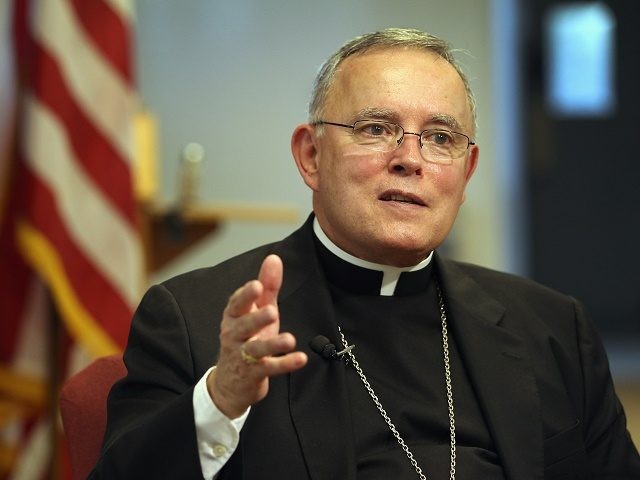In a clear but gently worded column, Philadelphia Archbishop Charles Chaput chides Jesuit priest Father James Martin for failing to summon gay Catholics to “conversion,” rather than simply asking for “affirmation.”
The Archbishop addresses a recent book by Father Martin, Building a Bridge, in which Martin “calls the Church to a spirit of respect, compassion and sensitivity in dealing with persons with same-sex attraction” while asking “the same spirit from persons in the LGBT community when dealing with the Church.”
This is good advice, and makes “obvious sense,” Chaput said, but it isn’t enough.
What Father Martin’s book “regrettably lacks,” Chaput writes, is “an engagement with the substance of what divides faithful Christians from those who see no sin in active same-sex relationships.”
The Church is not simply about unity, Chaput adds, but about unity in God’s love rooted in truth. This means that active homosexuals (or anyone in an illicit sexual relationship) “need conversion, not merely affirmation.”
Chaput’s critique echoes other reviews of Father Martin’s book that point out the conspicuous absence of any clear statement of Christian sexual ethics, as if he were embarrassed by it or simply disagrees with what his own Church teaches.
Eve Tushnet, for example, herself a lesbian Catholic who lives a celibate lifestyle, laments that traditional Christian sexual ethic is “never mentioned” in the book, and so the difficulties the teaching poses for gay Catholics are “never addressed.”
“In a culture where everything from pop songs to health insurance urges us to structure our lives around romance and marriage,” Tushnet writes in her Washington Post review, “gay Christians have a chance — or a duty — to show that you can make a life of devotion, joy and mutual sacrifice within celibacy.”
Father Martin, an active supporter of the LGBT community, has done much to call Catholics to a deeper respect and compassion toward gay people. At the same time, he seems to have failed LGBT Christians by not calling them to strive to live holy lives in accord with Catholic sexual ethics, confident in the mercy of God and the power of his grace.
To all my LGBT friends: Have a fun #Pride2017 weekend. Have pride (and feel joy) because you’re beloved children of God, made in God’s image
— James Martin, SJ (@JamesMartinSJ) June 25, 2017
In his critique, Archbishop Chaput contrasts Father Martin’s book with that of Daniel Mattson titled Why I Don’t Call Myself Gay, which the archbishop describes as “extraordinarily moving and powerful.” Citing the book at length, the differences with Martin’s book become abundantly clear.
In writing about his own homosexuality and struggles to live a celibate life, Mattson says that Catholics “cannot remain reluctant to speak about the beauty of the Church’s teaching on sexuality and sexual identity for fear that it will appear ‘unloving,’ ‘irrational,’ or ‘unreal.’”
Mattson declares that “the Christian vision of sexual reality” is part of the good news that Christians are “called to proclaim to a lost and confused world.”
“We need to be a light for the world and speak passionately about the richness of the Church’s understanding of human sexuality,” Mattson writes. “We can’t place the Good News of the Church’s teaching on human sexuality under a bushel any longer, for the world desperately needs the truth we have.”
In his column, Archbishop Chaput draws on a passage from Saint Paul’s letter to the Romans, noting its importance for understanding Christian teaching on homosexual relations.
“For this reason God gave them up to dishonorable passions,” Paul wrote. “Their women exchanged natural relations for unnatural, and the men likewise gave up natural relations with women and were consumed with passion for one another, men committing shameless acts with men and receiving in their own persons the due penalty for their error.”
In preaching the gospel of Jesus Christ, Chaput notes, Christians can’t just pick and choose which parts they will affirm and which they will omit.
“Sometimes Scripture’s lessons toward that end can be hard,” he wrote, but God cannot lie and his Word “always speaks the truth.”
“This is why Christians must never be ashamed of God’s Word – even when it’s inconvenient,” he wrote.
Follow Thomas D. Williams on Twitter Follow @tdwilliamsrome

COMMENTS
Please let us know if you're having issues with commenting.